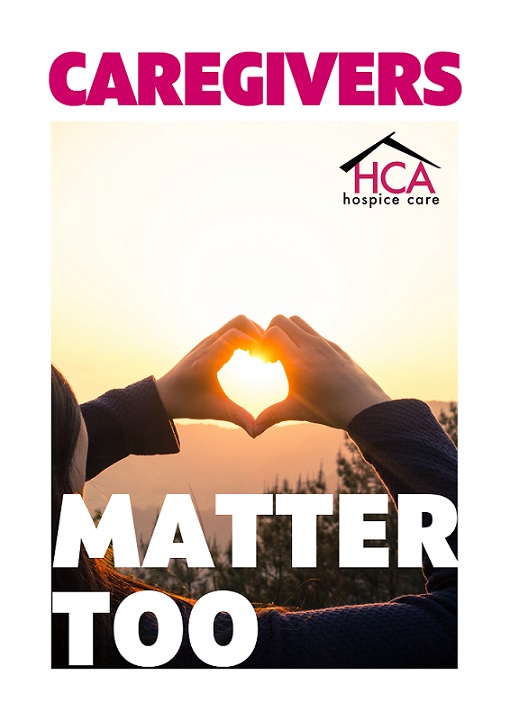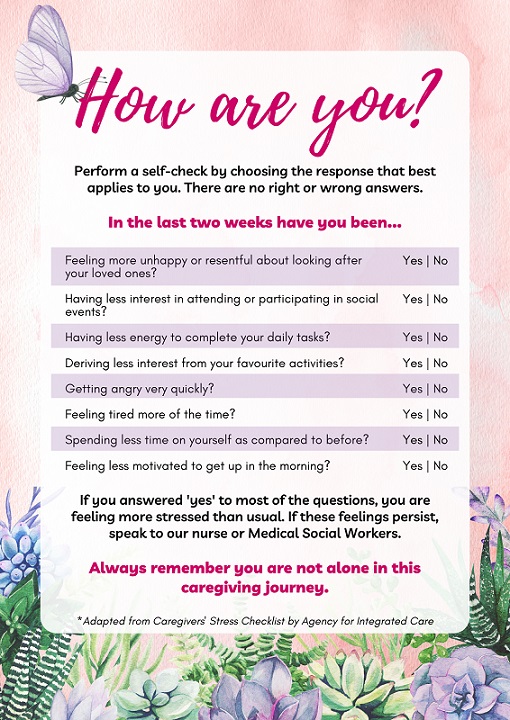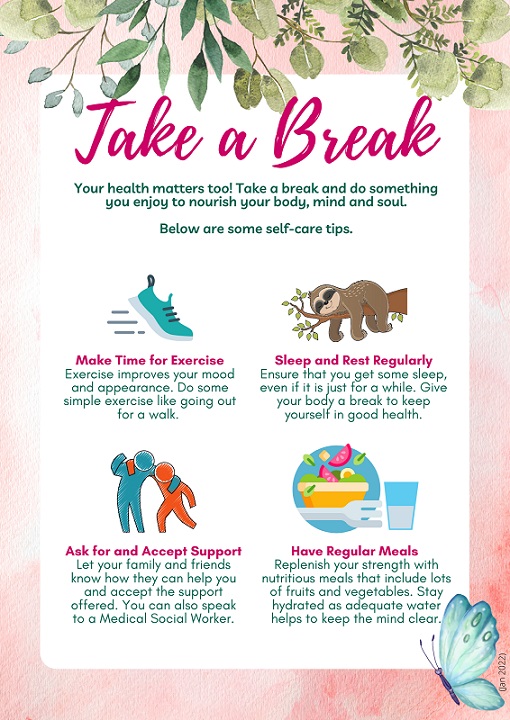
Close


Author of The Inspired Caregiver, Tia Walker, once said, “Caregiving often calls us to lean into love we didn’t know possible.”
Caregiving can simultaneously be a gruelling yet rewarding undertaking, requiring immense resilience and love – especially self-love. The end-of-life journey is often fraught with emotions and physical challenges, especially as patients become more frail.
To better support caregivers, the HCA psychosocial services (PSS) team recently rolled out the Caregivers Matter Too initiative. A caregiver booklet and lavender-infused eye pillow are given to caregivers by the nurses on their first home visit, in order to establish a bridge of communication. The caregiver booklet features a self-check list and some self-care tips, as well as contact details for the PSS team, should caregivers need a listening ear or advice.

A self-check list serves as a basic assessment for possible caregiver burnout and depression.
In line with the notion of self-care, the lavender-infused eye pillow serves as a practical and comforting gift for caregivers.
A sample of the lavender-infused eye pillow, which is designed to be carried on the go.
“The caregiving journey can be both physically and mentally exhausting. While the caregivers are taking care of their loved ones, we hope that caregivers can also practise self-care so that they feel more recharged,” explains HCA Medical Social Worker Paige Goh, who heads the project. “Most importantly, we want our caregivers to feel that they are not alone in this journey and HCA is here to support them.”

Simple self-care tips are included in the booklet as well.
Caregiver Rachel* can attest to the importance of self-care in powering through the caregiving journey. As the primary caregiver of her father and late mother, both HCA patients, Rachel has experienced the full gamut of challenges that accompany caregiving.
A veteran healthcare professional, Rachel considers her medical knowledge and experience an advantage in caring for her parents. “I know what to do, what to expect and what would be the end result,” she says simply.
In the weeks before Rachel’s mother passed on, she experienced an emotional dilemma. “I wanted her to live longer, but her leg was festering badly and worsening daily,” Rachel shares.
To keep her mother comfortable, Rachel would religiously clean her wound on a daily basis and place pandan leaves near her leg, so that the aroma would provide a soothing distraction for the elderly woman.
Her mother eventually passed on peacefully, which brought Rachel comfort and relief. “I did my best for her, so there is no regret,” she says.
Caregiving is undeniably challenging at times, but Rachel believes that empathy can provide a different perspective. “We can look at their pain, instead of focusing on our own pain,” she advises.
That shift in perspective has helped Rachel cope with the challenges of caring for her father, who has dementia and terminal cancer, and is prone to emotional and suicidal outbursts. “He can be grouchy at times, but we just try to attend to his requests as best as we can,” she says.
Similarly, it is a mind-set Rachel channels to her volunteering efforts, which brings her joy and emotional respite. “Before the pandemic hit, my friends and I would go overseas to conduct first aid and hygiene training,” she says. “Sharing knowledge is something that is close to my heart.”
Rachel advises caregivers to take a breather every now and then, away from the confines of home. “I like getting a relaxing cup of coffee on my own, or meet up with friends,” she says. “Sometimes we participate in charity drives to distribute necessities and clothes to the needy.
Most importantly, Rachel hopes that caregivers know that they are not alone on their journey. “Try to build up a social support network, reach out to the different organisations for help and plan ahead financially as well,” she says.
*not her real name